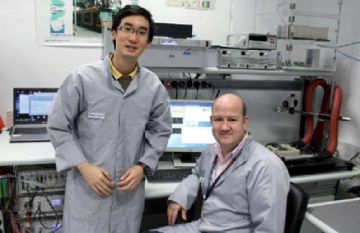Grooming new talents
According to the report published by the Japanese brokerage firm, Nomura Research in mid-2019, Malaysia emerged as the fourth biggest beneficiary after Vietnam, Taiwan, and Chile as a consequence of the U.S.-China trade war and the country’s E&E sector was amongst those which gained the most from this trade diversion. Today, the E&E sector in Malaysia is producing 13% of the world’s back-end semiconductor and 7% of the world’s semiconductor trade passes through the country. Indeed, the E&E sector accounts for 40% of Malaysia’s exports and the country’s total trade in E&E products in the first eight months of 2021 was approximately RM 477 billion.
In 2020, when Malaysia imposed cordon sanitaire (which was formally referred to as the “movement control order” by the Malaysian government) throughout the nation, productions in the E&E industries had been severely impaired. The shutting down of semiconductor production facilities throughout the world, in general, and in Malaysia, in particular, has engendered a global chip shortage crisis. With the restoration of Malaysia’s chip production capacity in early September this year, the world finally sees hope for the crisis to be ameliorated. The E&E sector is, unarguably, the indispensable locomotive of the nation’s economy, with many lucrative investment and employment opportunities attracting capital, both locally and globally.
As a university committed to offer undergraduate programmes which encourage the intellectual and personal development of students, as well as respond to professional and community needs, Universiti Tunku Abdul Rahman (UTAR) through its Faculty of Engineering and Green Technology (FEGT) is offering the Bachelor of Engineering (Honours) Electronic Engineering and the Bachelor of Technology (Honours) in Electronic Systems. Both these programmes specialize on the development of craftsmanship in the E&E sector. The key objective of the programmes is to produce technologists and engineers with the knowledge and expertise of electronic technology so as to fulfill the manpower needs of the E&E industries. The programmes are designed in such a way that they will gear the students towards the fourth industrial revolution (IR4.0) with the strengths and knowledge in smart manufacturing, internet of things (IoTs), robotics, artificial intelligence (AI), 5G technology, and, most importantly, semiconductor chip design and fabrication.
Designing and fabricating a semiconductor chip is laborious and they involve engineers that possess exoteric skills and knowledge. In UTAR, the department of electronic engineering in the Kampar campus is working closely with some of the major semiconductor chip players in the development of its curriculum. By receiving constant feedback and guidance from local and international semiconductor companies, such as Intel Corporation, Infineon Technologies and Oppstar Technology, the course syllabi and contents stay consistently vibrant and coherent with the bleeding edge of the semiconductor chip technology. The academic staff in-charge of the semiconductor chip related courses are aficionados who have had years of teaching and research experience in the relevant field.
“The employability statistics have shown that 99% of the graduates who complete the Bachelor of Engineering (Honours) Electronic Engineering are able to secure a job within 6 months of their graduation. This is convincing evidence which suggests that our curriculum is kept well abreast with the needs of the industries,” said FEGT Dean, Associate Professor Ts. Dr. Yap Vooi Voon.

A UTAR Master of Engineering (Electronic Systems) student undergoing
an industrial attachment.
Since UTAR has signed a mutual credit transfer agreement with Ostbayerische Technische Hochschule (OTH) Regensburg in Germany, the students pursuing the Master of Engineering (Electronic Systems) programme in UTAR can also obtain the Master of Electronic and Microsystems Engineering degree awarded by OTH Regensburg, upon fulfilling the specific requirements of both universities. Under this programme the students receive practical training in advanced companies such as Infineon Technologies AG, Osram Opto Semiconductors GmbH Regensburg and other partner companies in Germany or Malaysia.
The programme’s extensive areas of studies also enable graduates to gain
employment in both government and private sectors. Some of these industries
include semiconductor manufacturing companies, chip manufacturers, automated
machine vision inspection system providers, software development companies,
embedded systems developers, military and security services, and so on.

